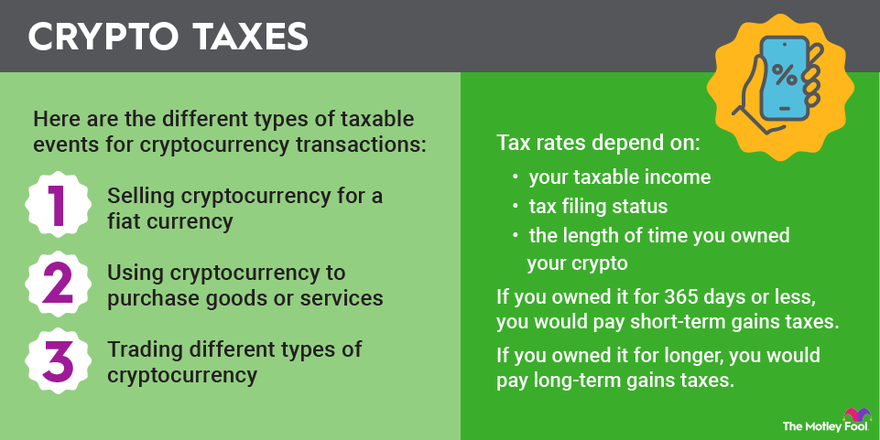How Do Crypto Taxes Work?
 " width="250" height="250">
" width="250" height="250">Imagine you've struck gold in the digital frontier. You've invested in cryptocurrencies, and now you're reaping the rewards. But wait, what about the taxman? How do crypto taxes work? Understanding cryptocurrency taxation is crucial for any investor navigating the complex world of digital assets. Let's dive in and demystify the tax implications of crypto, ensuring you're well-prepared to report your crypto income and optimize your tax strategies.
The Basics of Cryptocurrency Taxation
Cryptocurrency is treated as property by the IRS, similar to stocks or real estate. This means that general tax principles applicable to property transactions also apply to transactions using virtual currency. When you buy, sell, or trade cryptocurrency, you're subject to capital gains tax. But how do you calculate these gains? Let's break it down.
Understanding Capital Gains and Losses
Capital gains occur when you sell a cryptocurrency for more than you paid for it. Conversely, capital losses happen when you sell for less. These gains and losses are categorized as short-term or long-term, depending on how long you held the asset. Short-term gains are taxed as ordinary income, while long-term gains enjoy lower tax rates. So, how do you keep track of all this?
Reporting Crypto Income
Reporting crypto income can be a daunting task, but it's essential to stay compliant with digital asset tax rules. You'll need to report your crypto transactions on Form 8949 and Schedule D of your federal tax return. This involves detailing each transaction, including the date acquired, date sold, cost basis, and proceeds. Sounds like a lot of work, right? Fortunately, there are tools and software designed to simplify this process.
Navigating Tax Strategies for Crypto Investors
As a crypto investor, you have several tax strategies at your disposal to minimize your tax liability. One popular strategy is tax-loss harvesting, where you sell losing investments to offset gains from winning investments. Another strategy is holding your crypto for over a year to qualify for long-term capital gains tax rates. But what if you're a frequent trader? How do you stay on top of your tax obligations?
Keeping Accurate Records
Accurate record-keeping is the cornerstone of effective tax management. Every time you buy, sell, or trade crypto, document the transaction. Include details like the date, type of crypto, quantity, cost basis, and fair market value. This information will be invaluable when it's time to file your taxes. Think of it as your financial GPS, guiding you through the tax landscape.
Using Tax Software
Tax software can be a game-changer for crypto investors. These tools automatically track your transactions, calculate gains and losses, and generate the necessary tax forms. Some popular options include CoinTracker, CryptoTrader.Tax, and TaxBit. But which one is right for you? Consider factors like ease of use, integration with exchanges, and cost. Remember, investing in the right tools can save you time and money in the long run.
The Future of Crypto Taxation
The world of cryptocurrency is ever-evolving, and so are the tax implications. As governments worldwide grapple with how to regulate digital assets, we can expect changes in tax laws and reporting requirements. Staying informed and adaptable is key to navigating this dynamic landscape. So, how can you stay ahead of the curve?
Staying Informed
Keep an eye on regulatory developments and tax law changes. Follow reputable sources like the IRS website, financial news outlets, and industry experts. Join crypto communities and forums to exchange insights and stay updated. The more informed you are, the better equipped you'll be to handle the tax implications of your crypto investments.
Consulting a Tax Professional
When in doubt, consult a tax professional with expertise in cryptocurrency taxation. They can provide personalized advice tailored to your unique situation. Whether you're a casual investor or a seasoned trader, a tax pro can help you optimize your tax strategies and ensure compliance with digital asset tax rules.
Conclusion
Understanding how crypto taxes work is essential for any digital asset investor. From reporting crypto income to implementing tax strategies, staying informed and proactive is key. Remember, the tax landscape is always changing, so stay updated and consider consulting a tax professional. By taking these steps, you'll be well-prepared to navigate the complexities of cryptocurrency taxation and maximize your investment returns. So, are you ready to take control of your crypto taxes?
FAQs
1. What is the tax rate for cryptocurrency?
The tax rate for cryptocurrency depends on whether the gains are short-term or long-term. Short-term gains are taxed as ordinary income, while long-term gains enjoy lower tax rates. The exact rate will depend on your income bracket and the duration of your investment.
2. Do I need to report small crypto transactions?
Yes, you need to report all crypto transactions, regardless of their size. Even small transactions can add up and affect your overall tax liability. Accurate record-keeping is crucial for staying compliant with digital asset tax rules.
3. Can I deduct crypto losses?
Yes, you can deduct crypto losses to offset gains from other investments. This strategy, known as tax-loss harvesting, can help minimize your tax liability. However, it's important to follow the IRS guidelines and consult a tax professional if needed.
4. What happens if I don't report my crypto income?
Failing to report your crypto income can result in penalties, interest, and potential legal consequences. The IRS is increasingly scrutinizing crypto transactions, so it's essential to stay compliant with tax laws. If you're unsure about your reporting obligations, consult a tax professional.
5. Are there any tax-free crypto transactions?
Certain crypto transactions may be tax-free, such as transferring crypto between your own wallets or using crypto to purchase goods and services. However, these rules can be complex, and it's important to consult a tax professional to understand your specific situation. Always stay informed about the latest tax implications of crypto to make the most of your investments.
```
Belum ada Komentar untuk " How Do Crypto Taxes Work?"
Posting Komentar